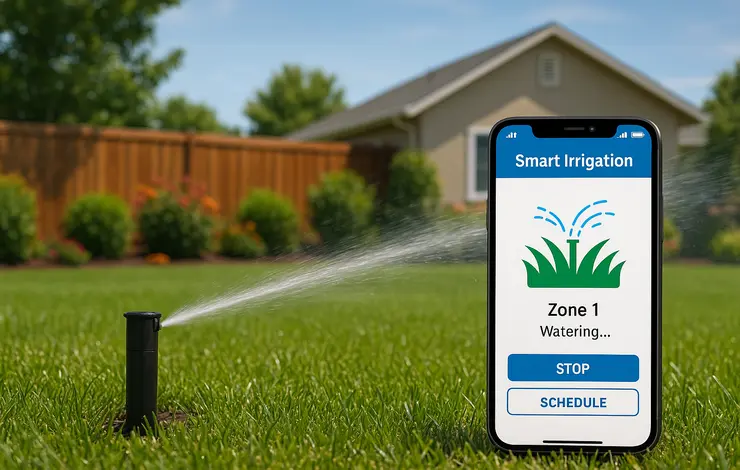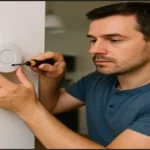Water is one of our most precious resources, yet many households unknowingly waste gallons daily due to leaks, inefficient appliances, and outdated systems. Enter smart home water management—a revolutionary approach that combines technology and sustainability to monitor, control, and conserve water usage in our homes.
In this article, we’ll explore the ins and outs of smart water solutions, from smart home water monitoring to smart home water automation, and provide a step-by-step guide to implementing these systems in your home.
Understanding Smart Home Water Management
Smart home water management refers to the integration of advanced technologies—such as sensors, IoT devices, and automation systems—to monitor and control water usage in residential settings. These systems provide real-time data, detect leaks, and even automate water flow, ensuring optimal water usage and preventing wastage.
The Importance of Smart Water Solutions
Implementing smart home water management systems offers numerous benefits:
- Leak Detection: Early identification of leaks can prevent significant water loss and property damage.
- Water Conservation: Monitoring usage helps in identifying areas where water can be saved.
- Cost Savings: Efficient water use leads to reduced utility bills.
- Environmental Impact: Conserving water contributes to environmental sustainability.
Smart Home Water Monitoring: Keeping an Eye on Every Drop
Smart home water monitoring involves using devices that track water usage in real-time. These devices provide insights into consumption patterns, helping homeowners make informed decisions.
Popular Smart Water Monitoring Devices
- Flume 2 Smart Water Monitor: Attaches to your existing water meter and provides real-time usage data via a smartphone app.
- StreamLabs Water Monitor: Uses ultrasonic technology to detect leaks and monitor water flow without the need for pipe cutting.
- Phyn Plus Smart Water Assistant: Offers high-definition pressure wave analysis to detect leaks and monitor water usage.
Enhancing Efficiency with Smart Home Water Efficiency Solutions
Smart home water efficiency focuses on optimizing water usage through advanced technologies and appliances.
Water-Efficient Appliances
- Moen Eco-Performance Faucets: Designed to reduce water flow without compromising performance.
- Water-Efficient Dishwashers: Modern dishwashers use significantly less water compared to older models.
Smart Irrigation Systems
- Rachio Smart Sprinkler Controller: Adjusts watering schedules based on weather forecasts and soil moisture levels, ensuring optimal water use for lawns and gardens.
Automating Water Usage: Smart Home Water Automation
Smart home water automation involves using technology to control water flow automatically, enhancing convenience and efficiency.
Key Components of Water Automation Systems
- Automated Valves: Control water flow based on preset schedules or sensor inputs.
- Leak Detection Sensors: Automatically shut off water supply when a leak is detected.
- Integration with Home Automation Systems: Allows for centralized control and monitoring.
Top Smart Water Automation Systems
- YoLink FlowSmart All-in-One System: Combines ultrasonic water metering with automated valve control for comprehensive water management.
- DROP Smart Water Management System: Offers leak detection, water softening, and filtration in a single platform.
Implementing a Smart Home Water Management System: A Step-by-Step Guide
- Assess Your Needs: Determine areas in your home where water usage can be optimized.
- Choose the Right Devices: Select devices that align with your specific requirements.
- Install Monitoring Devices: Set up water monitoring devices to track usage and detect leaks.
- Integrate Automation Components: Install automated valves and integrate them with your home automation system.
- Regularly Review Data: Use the data collected to make informed decisions and adjust settings as needed.
Smart Home Water Monitoring Apps: Control at Your Fingertips
Modern smart home water monitoring apps provide real-time data and control over your water systems.
Top Monitoring Apps
- Moen Smart Water Network App: Offers leak detection, usage monitoring, and remote shut-off capabilities.
- StreamLabs App: Provides real-time alerts and detailed water usage reports.
Conclusion: Embrace the Future of Water Management
Adopting smart home water management systems is a proactive step towards sustainability, cost savings, and convenience. By integrating monitoring devices, efficient appliances, and automation systems, homeowners can significantly reduce water wastage and contribute to environmental conservation.
Frequently Asked Questions (FAQ)
Q1: What is smart home water management?
A1: Smart home water management involves using technology to monitor, control, and optimize water usage in residential settings. This includes devices like sensors, automated valves, and monitoring apps that provide real-time data and control over water systems.
Q2: How do smart water monitoring devices work?
A2: These devices track water flow through your plumbing system, detecting usage patterns and identifying leaks. They often use ultrasonic or pressure wave technology to monitor water movement without invasive installation.
Q3: Can smart water systems help reduce my water bill?
A3: Yes, by identifying leaks and promoting efficient water usage, smart water systems can lead to significant reductions in water bills.
Q4: Are smart water management systems difficult to install?
A4: Many modern systems are designed for easy installation, often requiring no pipe cutting or extensive plumbing work. However, some systems may require professional installation, especially if they integrate with existing home automation systems.
Q5: Do these systems require regular maintenance?
A5: While smart water systems are generally low-maintenance, it’s advisable to periodically check device functionality and update software to ensure optimal performance.



